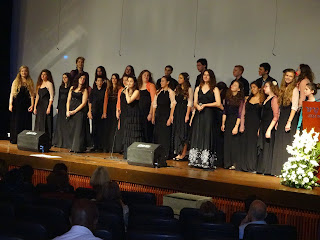Haifa is the centre for the activities of MASHAV, the training arm of Israel's Foreign Office. The courses offered in the centre bring people from all over the world even from countries with no diplomatic relations.
In November together with the UN Development Program and UN Women, MASHAV and the Haifa Centre is organizing the 28th International Conference for Women Leaders on “The Post-2015 and Sustainable Development Goals Agenda: Ensuring the Centrality of Gender Equality and Women’s Empowerment in the Next Framework.”.
If this conference is anything like the last, it will be very impressive. See more details of the work empowering women in the article below
Women’s empowerment: Education as a tool for
achieving equality
By DANIEL CARMON
10/20/2013 21:45
Investing in women’s and girls’ education is one of the most effective ways
to reduce poverty.
As the 2015 target date for achieving the Millennium
Development Goals approaches, a number of processes are under way among UN
Member States, the UN system, academia, policymakers and civil society to
reflect on the post-2015 development framework.
A growing number of states are reviewing and prioritizing the lessons learned
that need to be incorporated into the post-2015 framework. The most recent
(2012) Millennium Development Goals Report revealed that while there was
notable progress in some gender equality dimensions there remains much to be
done in every country, at every level, to achieve equality and women’s
empowerment.
Empowerment means moving from enforced powerlessness to a position of power.
Education is an essential means of empowering women with the knowledge, skills
and self-confidence necessary to fully participate in the development process.
Sustainable development is only possible when women and men enjoy equal
opportunities to reach their potential.
Women and girls experience multiple and intersecting inequalities.
Structural barriers in the economic, social, political and environmental
spheres produce and reinforce these inequalities. Obstacles to women’s economic
and political empowerment, and violence against women and girls, are barriers
to sustainable development and the achievement of human rights, gender
equality, justice and peace.
Across much of the world, either by law or custom, women are still denied the
right to own land or inherit property, obtain access to credit, attend school,
earn income and progress in their profession free from job discrimination.
Women are significantly under-represented in decision-making at all levels.
While the economic benefits of educating girls are similar to those of
educating boys, recent findings suggest the social benefits are greater.
Women have the potential to change their own economic status and that of their
communities and countries in which they live yet usually women’s economic
contributions are unrecognized, their work undervalued and their promise
undernourished.
Unequal opportunities between women and men hamper women’s ability to lift
themselves from poverty and secure improved options to improve their lives.
Education is the most powerful instrument for changing women’s position in
society.
Investing in women’s and girls’ education is one of the most effective ways to
reduce poverty.
In line with the Millennium Development Goals and the objectives established by
the international community, MASHAV, Israel’s Agency for International
Development Cooperation, at Israel’s Foreign Ministry, consistently promotes
the empowerment of women, considering women’s education a critical component of
development policy and planning, and central to sustainable development.
Following important changes in the international development landscape in
recent years MASHAV adopted a dual approach to development: We engage in active
development policy dialogues and development diplomacy, thus contributing to
and shaping policy at a higher, multilateral level.
And, through professional programs, we maintain an active and effective
presence at the field level.
One of MASHAV’s earliest affiliate training institutions, The Golda Meir Mount
Carmel International Training Center (MCTC), has addressed the connection
between gender, poverty reduction and sustainable development for over five
decades.
MCTC places education at the core of women’s ability to contribute to all
activities, working to enhance knowledge, competency and skills, including in
the development process and in their contributions to civil society.
Guided by this mindset, MASHAV, together with MCTC, the
UN Development Program and UN Women is organizing the 28th International
Conference for Women Leaders on “The Post-2015 and Sustainable Development
Goals Agenda: Ensuring the Centrality of Gender Equality and Women’s
Empowerment in the Next Framework.”
This November, senior women and men from the public and
associative sectors – ministers, members of parliaments, heads of women’s
associations, representatives of international organizations and
representatives of the judicial, business and academic sectors – will convene
in Haifa to discuss progress achieved and gaps remaining in the implementation
of the Millennium Development Goals from a gender perspective. We will
highlight lessons learned and best practices in advancing gender equality and
women’s empowerment.
Education is important for everyone, but it is a critical
area of empowerment for girls and women. This is not only because education is
an entry point to opportunity but also because women’s educational achievements
have positive ripple effects within the family and across generations.
Education is much more than reading and writing. It is an
essential investment countries make for their futures, a crucial factor in
reducing poverty and achieving sustainable development.










